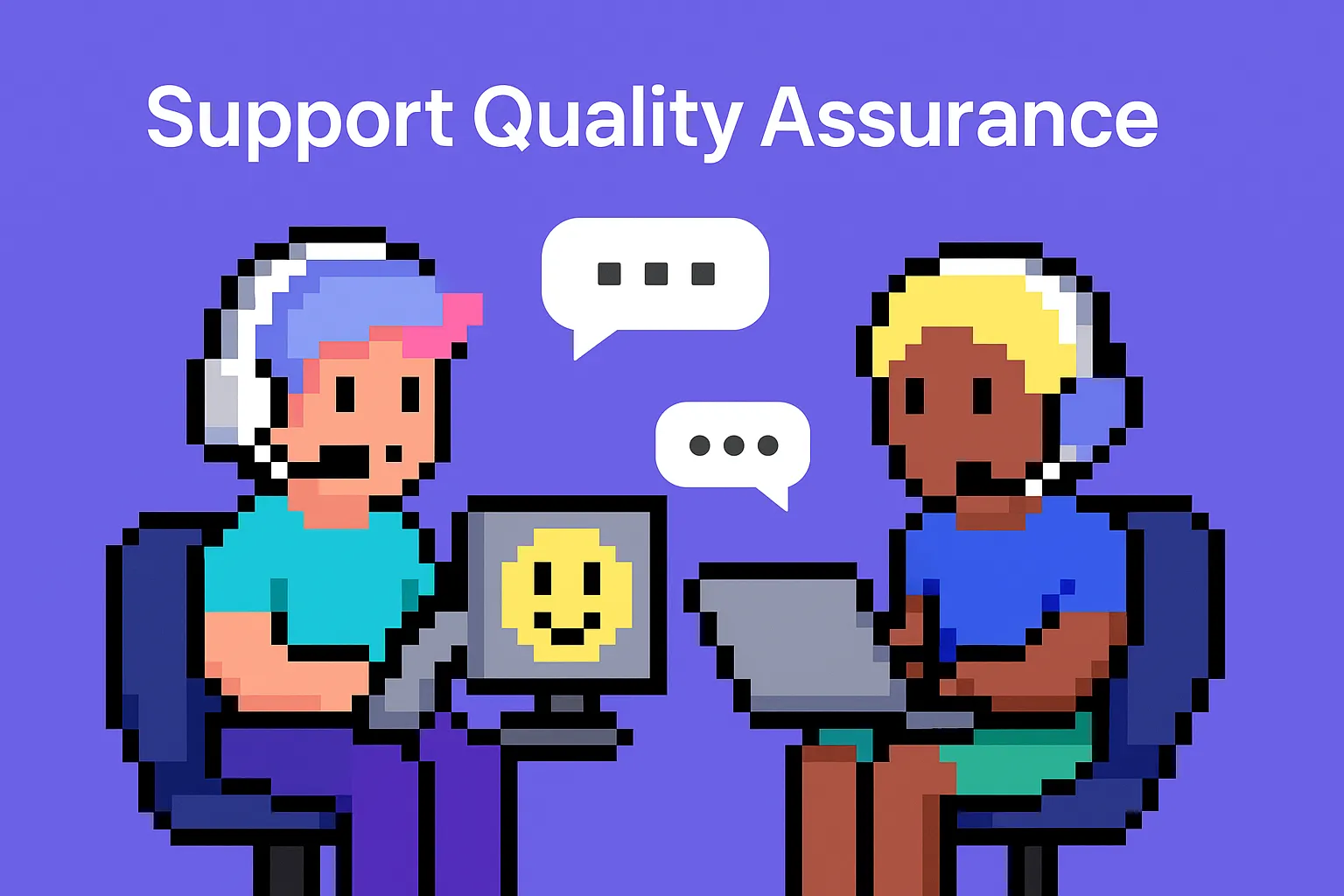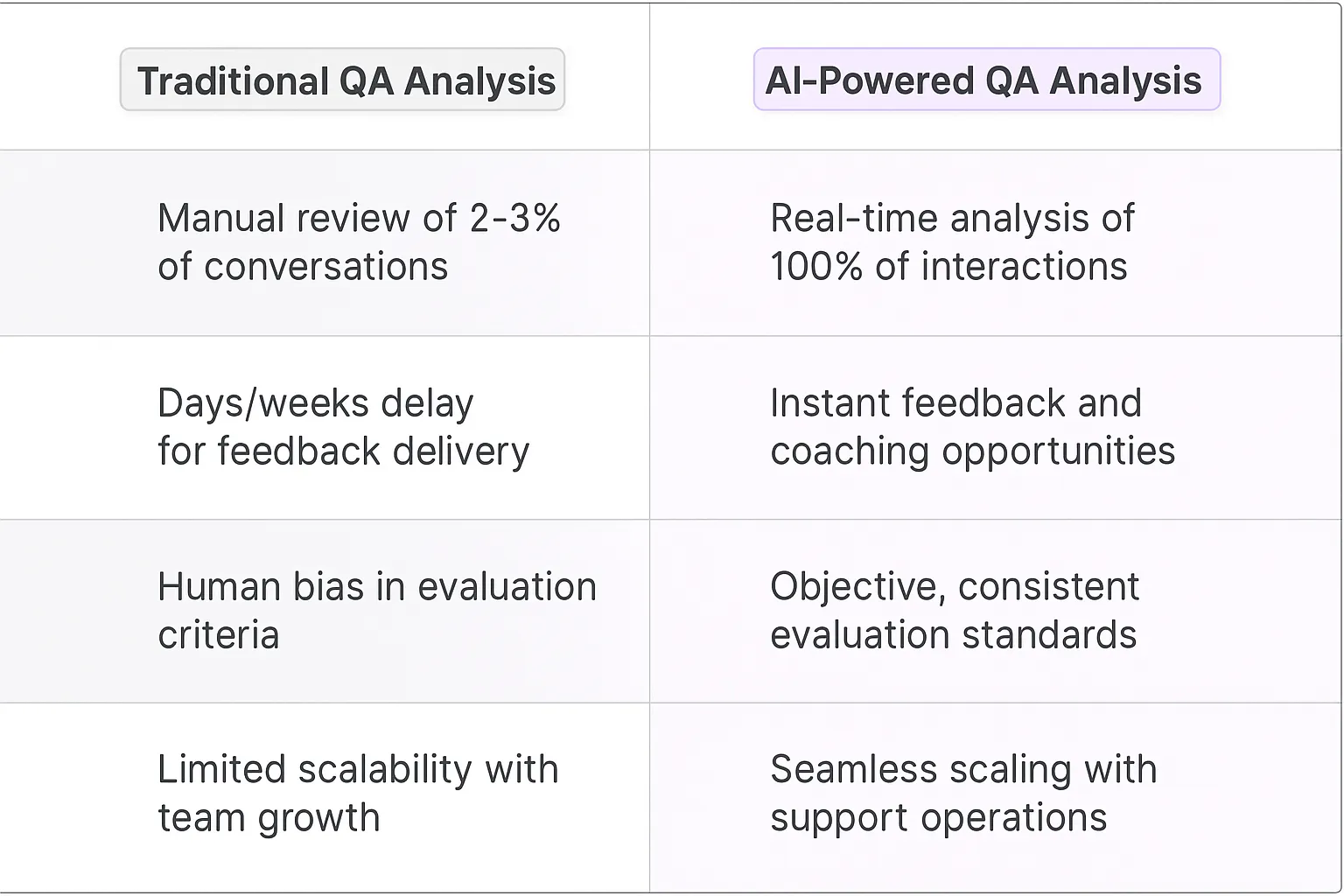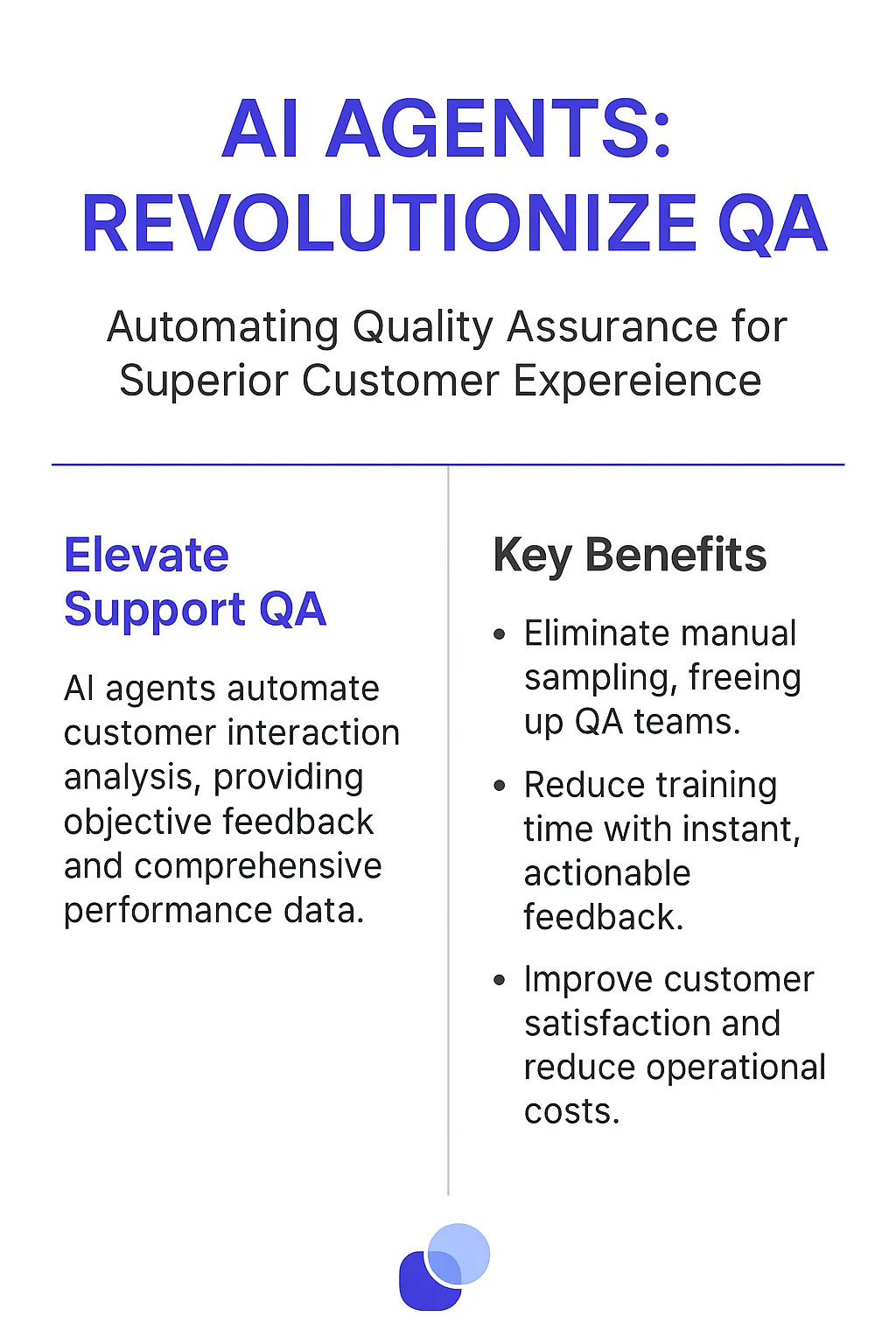Support Quality Assurance is the systematic process of monitoring, evaluating, and improving customer support interactions to ensure consistent, high-quality service delivery. Traditional QA relied on manual reviews of a tiny sample of conversations, but AI Agents now enable comprehensive analysis of every customer interaction, transforming how organizations maintain and improve their support standards.

Traditional QA analysis relied heavily on manual review processes that were both time-intensive and prone to inconsistency. Support teams would designate senior analysts to sample customer interactions, often reviewing only 2-3% of total conversations. They'd use static rubrics and spreadsheets, leading to bottlenecks and delayed feedback loops. The human limitations meant many quality issues slipped through, and scaling quality programs alongside growing support operations was nearly impossible.
The introduction of AI Agents into support QA creates a network effect that compounds the value of every interaction. These digital teammates can analyze 100% of customer conversations in real-time, identifying patterns and insights that would be impossible to spot through manual sampling.
The most fascinating aspect is how AI Agents learn and adapt to your specific support culture and brand voice. They don't just apply generic rules - they understand the nuanced differences between "good" and "great" customer interactions based on your historical data and success patterns.
A key growth lever is the AI's ability to provide instant, actionable feedback. Support agents receive guidance while conversations are still active, rather than waiting days or weeks for traditional QA reviews. This creates tight feedback loops that accelerate skill development and consistency.
The scalability factor is particularly compelling. As support volumes grow, AI Agents maintain consistent quality oversight without requiring additional QA headcount. They also eliminate human bias from the equation, ensuring every agent receives fair and objective feedback based on the same criteria.
From a metrics perspective, organizations using AI for support QA typically see a 30-40% improvement in first-contact resolution rates and a 25% reduction in average handle time - not because agents are rushing, but because they're getting better at addressing customer needs efficiently.

Support QA is entering a new era where digital teammates can process thousands of interactions simultaneously, creating a powerful feedback loop for continuous improvement. The most interesting aspect isn't just the scale - it's how AI agents are uncovering subtle patterns human QA analysts might miss.
When we look at high-performing support organizations, their QA processes typically hit a ceiling due to sampling limitations. AI agents break through this ceiling by analyzing 100% of interactions, transforming QA from a reactive spot-check system into a proactive quality engine.
The network effects here are fascinating - each interaction analyzed makes the AI agent smarter at identifying quality issues, which leads to better recommendations, resulting in improved agent performance. This creates a compounding advantage for organizations that implement these systems early.
What's particularly compelling is how this shifts the role of human QA analysts from repetitive reviews to strategic quality architects. They're now free to focus on evolving quality frameworks and coaching strategies that drive meaningful improvements in customer experience.

Support QA Analysts face intense pressure to maintain consistency across thousands of customer interactions while keeping response times lightning-fast. AI agents are transforming this traditionally manual role by bringing intelligence and scale to quality monitoring.
The versatility of AI agents in Support Quality Assurance makes them valuable across various industries. When we look at real-world applications, we see AI agents functioning as skilled digital teammates who can analyze support conversations at scale, identify coaching opportunities, and ensure brand voice consistency.
What's particularly fascinating is how these AI agents adapt to different industry contexts - from SaaS companies handling technical support tickets to retail brands managing high-volume customer service operations. They're not just monitoring conversations; they're actively identifying patterns, flagging potential issues, and providing actionable insights that help QA teams focus their energy where it matters most.
The most compelling aspect is how AI agents are redefining the feedback loop in support QA. Rather than waiting for periodic reviews, teams now have access to real-time quality insights that enable immediate course correction and continuous improvement. This shift from reactive to proactive QA is creating a new paradigm in support quality management.
A rapidly growing direct-to-consumer fashion brand faced a classic scaling problem - maintaining consistent, high-quality customer support across their expanding support team of 50+ agents. Their support QA manager was drowning in manual ticket reviews, managing to evaluate only 2% of total interactions.
By implementing a Support QA Analyst AI Agent, they transformed their quality assurance process. The AI evaluates 100% of support conversations against a detailed rubric covering tone, accuracy, completeness, and compliance with brand guidelines. But the real magic happens in the nuanced analysis.
The AI doesn't just flag basic issues - it identifies subtle patterns like agents gradually drifting from brand voice, inconsistent product recommendations, or missed opportunities for customer retention. For example, it caught that newer agents were over-promising delivery times during peak seasons, leading to preventable customer disappointment.
What's fascinating is how this creates a continuous feedback loop. The QA manager now focuses on strategic coaching rather than manual reviews. They use AI-generated insights to create targeted training modules. When they noticed agents struggling with questions about their new sustainable packaging initiative, they quickly developed specific guidance and saw improvement within days.
The metrics tell the story: customer satisfaction increased 18% within three months, first-contact resolution improved by 23%, and agent confidence scores (measured through internal surveys) jumped 31%. But perhaps most importantly, they maintained their distinctive brand voice - witty, empathetic, and fashion-forward - even as they scaled from 50 to 80 agents.
This isn't just about automation - it's about augmenting human capabilities to create consistently exceptional customer experiences at scale. The AI becomes a force multiplier for the QA team's expertise, allowing them to maintain high standards while focusing their human touch where it matters most.
A multi-state healthcare provider network with 200+ clinics struggled to maintain consistent, compliant patient communication across their support operations. Their team of 120 support agents handled everything from appointment scheduling to billing inquiries, but their QA team could only review 3% of interactions manually.
The implementation of a Support QA Analyst AI Agent transformed their operation in unexpected ways. Beyond basic compliance checking, the AI analyzes every single patient interaction for empathy, medical terminology accuracy, and HIPAA compliance. The fascinating part? It picks up on subtle emotional undercurrents that even experienced QA managers sometimes miss.
The AI identified that agents were struggling most with complex insurance explanations, often using technical jargon that confused patients. It flagged patterns where agents, though technically correct, were causing unnecessary anxiety through their word choice. For instance, saying "your claim was rejected" instead of "we'll need additional information to process your claim."
The ripple effects were profound. The QA team shifted from spending hours scanning transcripts to developing targeted coaching programs. They created a "language library" of empathetic responses for common situations, backed by data showing which phrases resulted in better patient outcomes. When the AI detected confusion patterns around their new telehealth services, they quickly adjusted their communication templates.
The numbers are compelling: patient satisfaction scores rose 27%, complaint rates dropped 42%, and first-call resolution improved 33%. But the real win came from unexpected places - their risk management team reported a 51% reduction in communication-related incidents, and agent turnover decreased by 28% as staff felt more confident in their interactions.
This case demonstrates how AI can enhance human empathy rather than replace it. The QA team now operates as strategic communication architects, using AI-driven insights to build better patient experiences. They're not just maintaining quality - they're systematically improving it through a data-driven approach to human connection.
Building effective Support QA AI agents requires overcoming several complex technical hurdles. The first major challenge lies in training models to understand the nuanced context of support interactions. These digital teammates need to parse through various communication styles, technical jargon, and customer-specific terminology while maintaining accuracy in their assessments.
Data privacy presents another significant technical barrier. The AI needs access to sensitive customer conversations and internal documentation, requiring robust security protocols and careful handling of personally identifiable information (PII). Organizations must implement sophisticated data masking and encryption systems while ensuring the AI maintains enough context to perform meaningful analysis.
Integrating Support QA AI agents into existing workflows demands careful consideration of human factors. Support teams may initially resist AI-driven quality monitoring, viewing it as intrusive or threatening. Creating clear guidelines about how the AI's insights will be used and establishing transparency in the evaluation process becomes crucial for team adoption.
Calibrating the AI's judgment criteria poses another operational challenge. Support interactions often require emotional intelligence and contextual understanding that can be difficult to quantify. Organizations must invest time in fine-tuning the AI's evaluation parameters to align with their unique quality standards while accounting for edge cases and exceptional situations.
As support operations grow, maintaining consistent QA standards becomes increasingly complex. The AI must adapt to new products, evolving customer needs, and changing company policies. Regular model updates and retraining cycles are necessary to prevent drift and ensure continued accuracy. This requires dedicated resources and expertise in AI model maintenance.
Additionally, organizations need to establish processes for handling disagreements between human QA specialists and AI assessments. Creating an effective feedback loop that incorporates human insight while maintaining the efficiency benefits of AI automation requires careful balance and ongoing refinement.
The integration of AI Agents into Support Quality Assurance marks a fundamental shift in how organizations approach customer service excellence. By analyzing every interaction, providing real-time feedback, and uncovering deep insights, these digital teammates enable support teams to scale while maintaining exceptional quality standards. The network effects of AI-powered QA create a continuous improvement cycle that benefits agents, customers, and organizations alike. As support operations continue to evolve, the strategic advantage of AI-enhanced quality assurance will become increasingly critical for competitive differentiation.